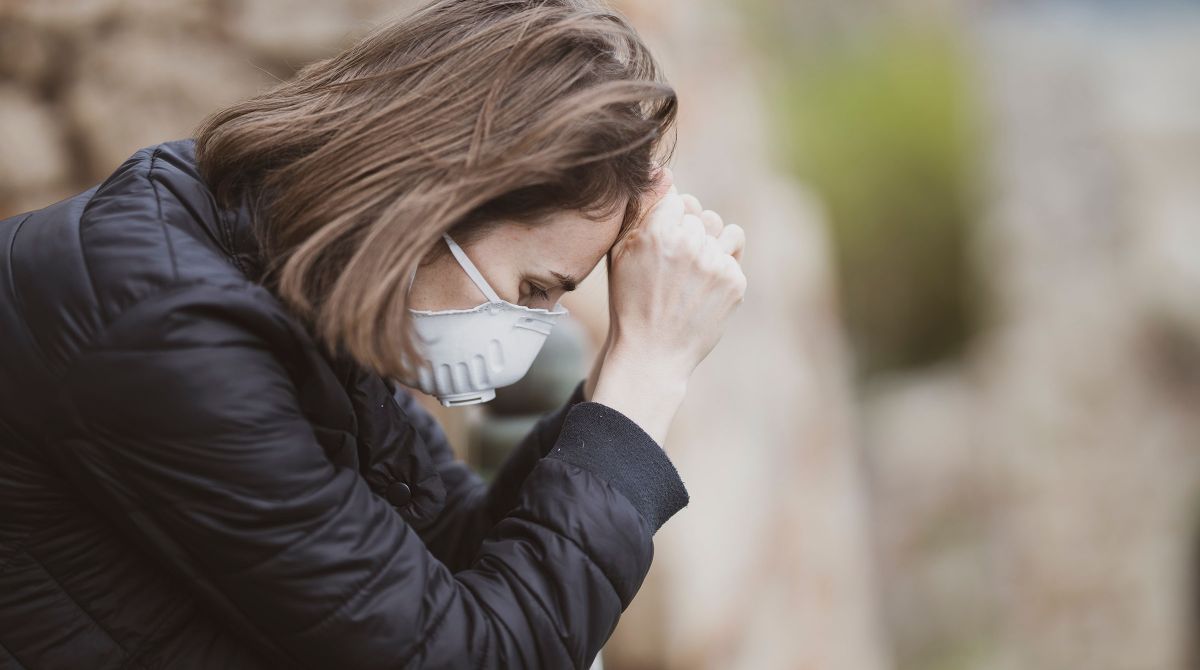Covid-19 anxiety syndrome still causing one in five to struggle with return to normal living, new survey involving Kingston University expert finds
Posted Tuesday 6 July 2021
 A new survey by researchers at Kingston University and London South Bank University have found that Covid-19 Anxiety Syndrome is still causing many people to struggle with the return to normal life.
A new survey by researchers at Kingston University and London South Bank University have found that Covid-19 Anxiety Syndrome is still causing many people to struggle with the return to normal life.
A new survey by Kingston University in collaboration with London South Bank University (LSBU) has found that Covid-19 Anxiety Syndrome is still causing many people to struggle with reintegration into daily life.
The new UK-wide survey of 975 people, conducted in late June, comes in the week the government set out plans to remove most Covid-19 restrictions from 19th July.
Previous research from the team involved a survey of 286 UK-based participants conducted during lockdown in February which showed a fifth of respondents were suffering from the syndrome. The latest research shows that, as restrictions have eased, a level of anxiety remains.
Covid-19 Anxiety Syndrome is a pandemic-related phenomenon that consists of forms of coping, such as attention to threat, worry, avoidance and excessive checking, that can keep people locked into a state of continuous anxiety and fear of contracting the virus.
Among the key findings were that:
- One in five people scored highly on the Covid-19 Anxiety Syndrome scale.
- 40 per cent strongly reported avoiding touching things in public spaces because of a fear of contracting the virus.
- 30 per cent strongly reported avoiding public transport because of a fear of contracting the virus.
- 23 per cent strongly reported avoiding going out to public places because of a fear of contracting the virus.
- 25 per cent strongly reported paying close attention to others displaying possible symptoms of the virus.
People who had lost a family member to Covid-19 were more likely to show higher levels of Covid-19 Anxiety Syndrome. There was no particular association with age, gender, or vaccination status.
Ana Nikcevic, Professor of Psychology at Kingston University's Faculty of Business and Social Sciences, and Professor Marcantonio Spada from LSBU's Centre for Addictive Behaviours first identified the concept of Covid-19 Anxiety Syndrome in April 2020.
Their research found that some people were developing a particular set of behaviours due to their fear of the virus. They conducted the latest study in collaboration with Professor Ian Albery from LSBU's Centre for Addictive Behaviours Research.
 Prof Ana Nikcevic said some people will need to be supported to return to normality.
Prof Ana Nikcevic said some people will need to be supported to return to normality.
Despite the re-opening of UK society, a significant number of people are struggling with aspects of Covid-19 Anxiety Syndrome, Professor Nikcevic said.
"Our research suggests that a significant minority continues to be avoidant and highly focused on the threat of infection, which will make return to normal daily living difficult. They will need to be supported to return to normality," she said.
The data shows that after one month of re-opening of society, many people are still struggling with aspects of the syndrome, a similar figure to the previous survey conducted during full lockdown, Professor Spada added.
"This means that there are still many people who find it difficult to disengage from the Covid-19 threats which may make return to normal daily living harder as restrictions ease," he said.
"Our new findings show how vital it is that people affected by Covid-19 Anxiety Syndrome receive support. Mapping out how we will do this will become a priority for mental health service providers."
- Read more about the Covid-19 Anxiety Syndrome Scale.
- The research data was collected from a UK national sample of 975 survey respondents on 21 June 2021. The sample was equally split between the genders.
Contact us
General enquiries:
Journalists only:
- Communications team
Tel: +44 (0)20 8417 3034
Email us



